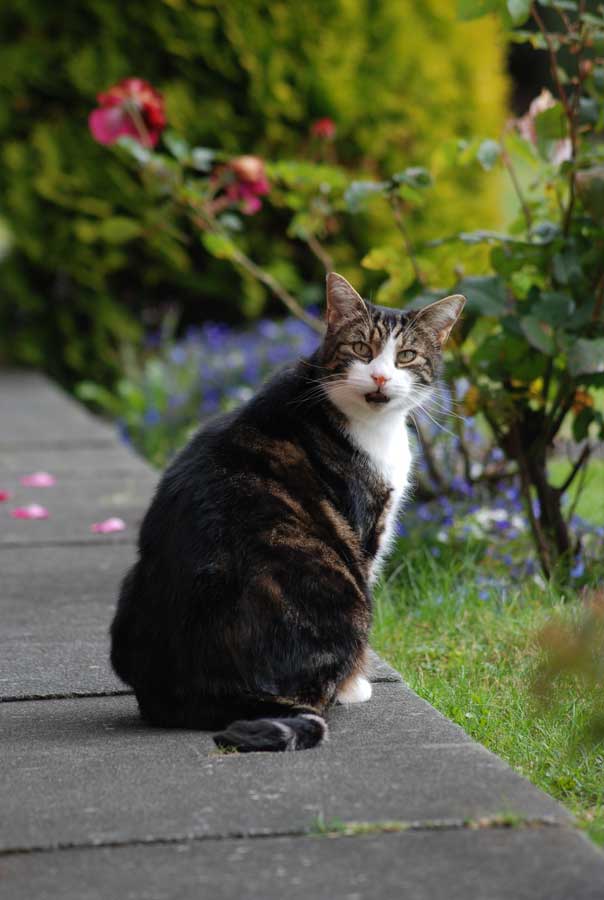Veterinary college's Thatcher explains why humans are not the only creatures suffering from obesity

It's no secret that obesity is a problem in humans. Reality television makes millions of dollars chronicling the efforts of Americans attempting to shed excess weight. And every day, new medical research highlights the serious implications obesity has for heart disease, diabetes and other maladies.
Now, more and more attention is being paid to the problem in our pets. According to a recent study published in the Journal of Veterinary Internal Medicine, the prevalence of obesity in dogs is between 22 and 40 percent. The reasons and the remedies for the problem seem to mirror each other across species.
These include decreased physical activity, age, and an increased caloric intake, according to Dr. Craig Thatcher of Blacksburg, Va., a professor in the Department of Large Animal Clinical Sciences in the Virginia-Maryland Regional College of Veterinary Medicine at Virginia Tech, noted veterinary nutritionist, and charter diplomate in the American College of Veterinary Nutrition.
Genetics can also increase a pet’s risk of being overweight, Thatcher said. Labrador retrievers, beagles, and cocker spaniels are all breeds that are more like to carry some extra pounds. There are also endocrine diseases that are associated with obesity that must also be considered and ruled out, before the pet undergoes weight reduction, explains Thatcher.
Like humans, there are also many health problems associated with being obese. Dogs and cats that are overweight may be predisposed to develop diabetes mellitus. They may also suffer from decreased heat tolerance and stamina, increased dermatological conditions, decreased immune function, and multiple musculoskeletal and orthopedic problems. If an owner suspects his or her pet is overweight, the first step is to contact their veterinarian.
“Veterinarians are the best resource to assist clients in designing a safe and effective weight reduction program,” says Thatcher.
Veterinarians will work with the client to design a weight reduction program that is specific to the individual pet’s needs. A balanced, restricted-calorie diet should be implemented with the owner carefully monitoring intake and not allowing for free-choice consumption by the pet. An exercise regiment should also be initiated. This should be a plan the owner is willing to comply with and one the animal can comfortably perform, explains Thatcher.
As the animal progresses through a weight loss program, owners must monitor their pet’s progress by weighing and by assessing body condition. This should initially be done every two weeks to ensure the animal is successfully losing weight.
“Avoiding obesity is an important part of the overall wellness of an animal,” said Thatcher. “Pets and their owners alike will enjoy a much higher quality of life when the pet maintains a healthy weight.” The Virginia-Maryland Regional College of Veterinary Medicine established one of the nation’s first clinical nutrition training programs more than 20 years ago, thanks to Thatcher’s leadership. Today, the college’s programs in this area enjoy wide respect from throughout the profession.
Thatcher earned his doctorate in veterinary medicine and his master’s of science and doctor of philosophy in nutritional physiology from Iowa State University. Prior to joining the faculty of the Virginia-Maryland Regional College of Veterinary Medicine in 1983 as an assistant professor, he practiced mixed animal medicine in Pennsylvania. He was one of the first veterinarians to be board certified as a diplomate by the American College of Veterinary Nutrition.
The Virginia-Maryland Regional College of Veterinary Medicine (VMRCVM) is a two-state, three-campus professional school operated by the land-grant universities of Virginia Tech in Blacksburg and the University of Maryland at College Park. Its flagship facilities, based at Virginia Tech, include the Veterinary Teaching Hospital, which treats more than 40,000 animals annually. Other campuses include the Marion duPont Scott Equine Medical Center in Leesburg, Va., and the Avrum Gudelsky Veterinary Center at College Park, home of the Center for Government and Corporate Veterinary Medicine. The VMRCVM annually enrolls approximately 500 Doctor of Veterinary Medicine and graduate students, is a leading biomedical and clinical research center, and provides professional continuing education services for veterinarians practicing throughout the two states. Virginia Tech, the most comprehensive university in Virginia, is dedicated to quality, innovation, and results to the commonwealth, the nation, and the world.




